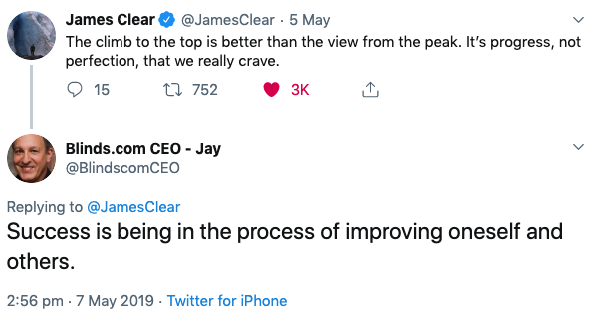One thing that always stands out in my conversations with high-performers, the books I read, and the people I engage with who make me want to bring my A-game: they do all important things with clear intent.
Since I’m always on the lookout for strategies that can improve our decision-making process, I wanted to pause and zoom in on intent for today’s newsletter.
Without generalizing, I can safely say that people often react to the things that happen around them rather than act on their own will.
A big chunk of human behavior is governed by adjustment, a process that helps us balance conflicting needs and overcome challenges in our environment.
Besides that, we also constantly adapt to social situations and are bombarded with attempts to influence our behavior in way or another.
For example, my mom would like me to get married (2-3 years ago), my boyfriend would like to see me much more relaxed than I generally am (I feel ya, babe!), and some of my friends would like to hang out more (so do I, guys).
When you pause, step back and look at all these factors, you may notice or feel that they’re little room left for what you want. I know I experience this feeling more frequently than I’d like to. And if you’re a people pleaser like me or Cristina, the challenge is even bigger.
It’s not that our willpower is that weak. It’s just that we lack the exercise. Plus, we often “spend” our willpower on others, which leaves us quite depleted.
“We are rational and responsible in terms of our intentions and commitments made to others, but not to ourselves. The same lack of action often happens with other intentions to self, including: saving for retirement, flossing our teeth, watching less TV, eating less salt, watching our caloric intake . . . You know this list.” Timothy A Pychyl Ph.D.
Cultivating intent
I, for one, believe that spending time and energy on cultivating intent is essential for our mental health, productivity, and general wellbeing. It’s also fundamental for strengthening our identity.
This is not new of course. The Stoics talked about this millennia ago.
It’s about time we made more of this opportunity to grow into ourselves, isn’t it?
To reap the benefits of thinking and acting with a purpose in mind requires that we let go of using external factors as an excuse for our behavior and taking more responsibility for our reactions.
Simply put, calling bullshit on ourselves is probably one of healthiest mental habits we can acquire.
What intent helps you achieve
When you analyze your behavior with intent or set out to accomplish a specific, measurable goal, a couple of great things happen:
- You become more adept at planning which means you’ll move faster, get better results, and use your resources more effectively (think of wasting less time on tasks you can automate, for example).
- You enhance your mental preparedness so you become better equipped to deal with surprises, changes, and unforeseen events.
- You achieve focus because you can use your intent to guide your decisions.
- Naturally, you also get more clarity about what you need and what you need to let go of to achieve your goal.
- You get better at tracking your progress and adjusting your actions as you go. Creating this personal feedback loop is a crucial instrument in your development. I included an example that speaks to this below.
When you commit to your learning process this way, your self-awareness increases exponentially and so does your self-confidence.
The better you understand your own reactions and emotions, the more effectively you can manage them. For example, if you spend time pinning down the true sources of your anxiety, you can plan to avoid them or reframe them to maintain your balance.
Cultivating intent implies building a discipline you can rely on. No matter what happens, you will have a strong process that helps you learn and improve constantly, thus making you more adept at dealing with complexity, uncertainty, and all of the other difficult situations that inherently come up when you seek to operate at peak performance.
There is release and freedom in knowing yourself
A strong personal identity makes you less afraid of what other people think.
Tracking your progress (with intent) motivates you to keep going.
Determination and focus are easier to support over a longer period of time when you have a clear end goal in mind.
Decisions become an opportunity to learn and explore instead of a burden.
Resisting influence and having your mission hijacked by other people’s needs becomes less difficult too.
5 strategies to learn and decide with intent
Now that we’ve talked the talk, it’s time to practice what we preach.
Here are 5 frameworks you can try to cultivate intent and improve your decision-making skills in the process:
- Debrief like a pilot
- Define your personal philosophy
- Differentiate between your learning zone and your performance zone
- Focus on building your process
- Teach others
To wrap things up, I chose an idea included in one of the resources above:
“Good decisions are valuable but they are more valuable if they are part of a good decision process because a good process allows for feedback about where you can improve.” – Shane Parrish
I intend to have a peaceful Sunday spent with as little time as possible glued to any sort of screen.
What do you intend to do for yourself today?
